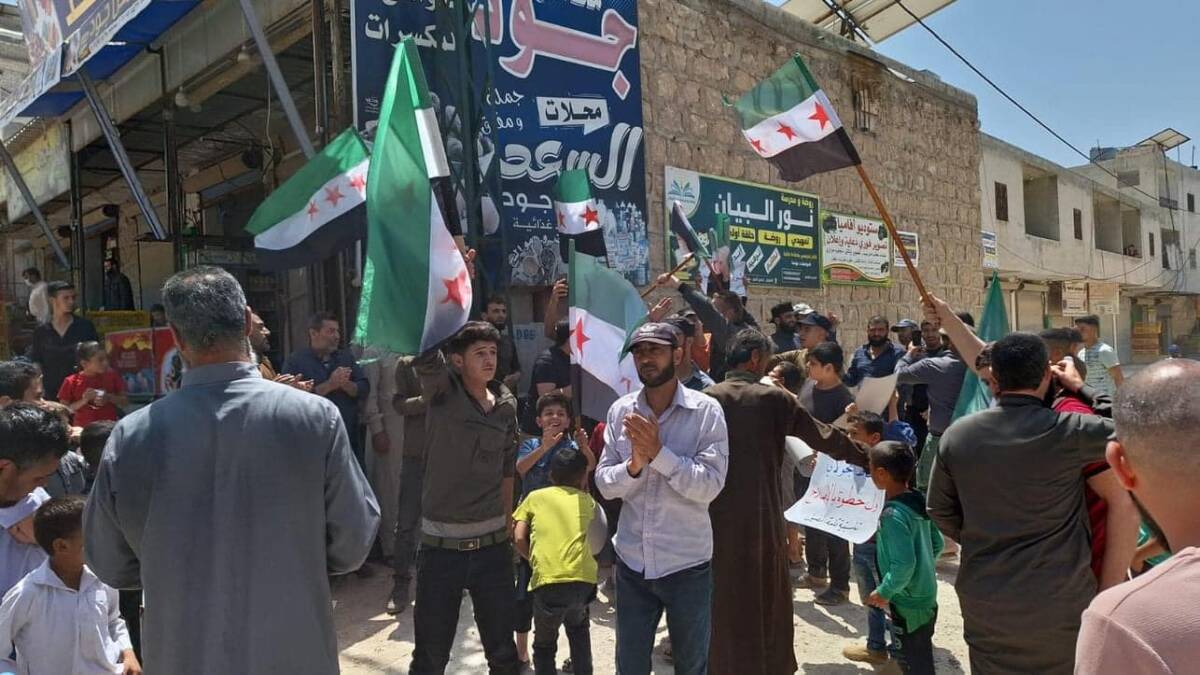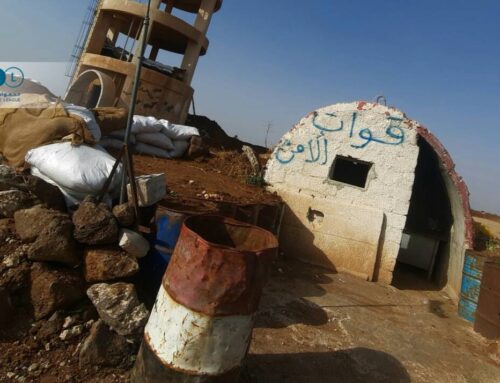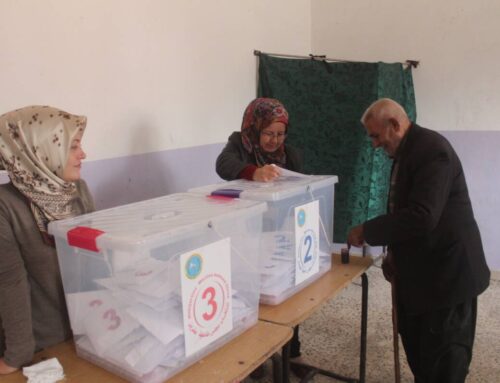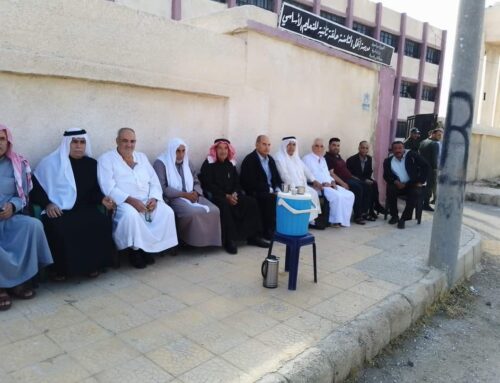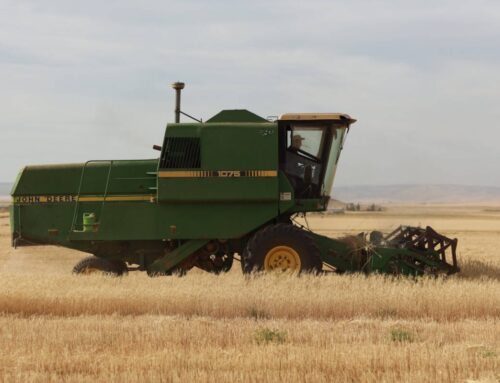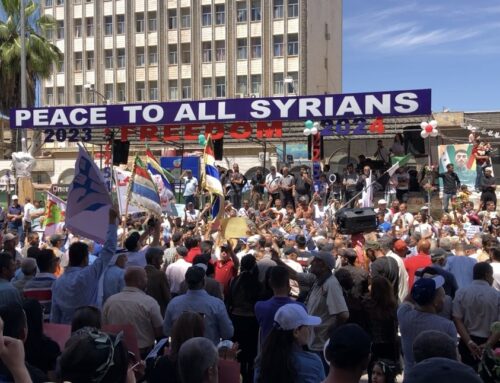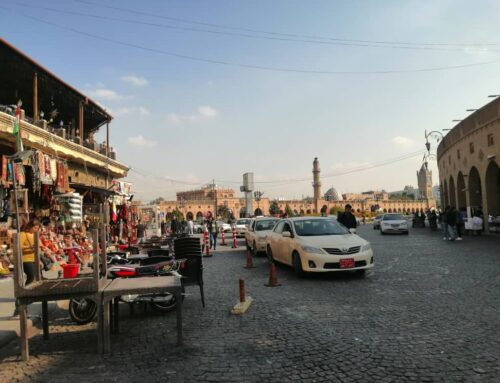HTS cracks down on Idlib demonstrations as protest movement persists
Demonstrators in northwestern Syria continue to demand the fall of HTS leader Abu Muhammad al-Jolani, while authorities offer concessions with one hand and crack down on protests with the other.
17 May 2024
IDLIB/BRISTOL — Hayat Tahrir al-Sham (HTS)-affiliated security forces attacked protesters at demonstrations in cities and towns across Syria’s northwestern Idlib province on Friday as the hardline group grapples with a movement calling for the fall of its leader, Abu Muhammad al-Jolani.
In the Idlib cities of Binnish and Jisr al-Shughour, security forces beat protesters with batons, deployed tear gas, struck demonstrators with armored vehicles and used live gunfire to disperse gatherings, according to posts and videos circulating on social media. In response, protesters threw stones and other items. Several demonstrators were reportedly injured, alongside a number of HTS personnel.
Earlier in the day, HTS forces had deployed security forces and set up checkpoints and roadblocks to prevent protesters in towns outside the provincial capital, Idlib city, from reaching it for a central demonstration, Syrian media reported, citing local sources.
Abdul Rahman Talib, a 30-year-old from Latakia province who has lived in Idlib since 2011, was at the protest in Jisr al-Shughour on Friday. He has been coming out to anti-HTS demonstrations since they began in February following the death in custody of a man imprisoned by the faction.
Abdul Qader al-Hakim, a member of the Islamist faction Jaish al-Ahrar, had been detained ten months earlier by HTS. Following pressure from his group, HTS revealed where his body was buried in western Idlib, Fadel Abdul Ghany, the director of the United Kingdom (UK)-based Syrian Network for Human Rights (SNHR) said. “The faction led a military convoy there, extracted the man’s decomposing body and took it to his family’s house.”
“It was discovered that he’d been tortured,” Talib told Syria Direct. “This prompted a lot of bad feelings in the area. The next day, we went out to protest.”
The protests have continued ever since. Most Fridays, men and women of all ages turn out in their dozens, hundreds and sometimes thousands—in Idlib city, Binnish, Darat Izza, Jisr al-Shughour, Atareb—across HTS-held parts of northwestern Syria.
Their demands are wide ranging, and include calls for an end to violations in HTS prisons, the release of detainees, economic and policy reforms and, loudest of all, the resignation of al-Jolani.
Friday’s violence showed one side of a two-pronged approach HTS and the Salvation Government it backs have taken towards the movement: offering concessions with one hand, and cracking down with the other through attacks and arrests.
Crackdown
On May 15, al-Jolani issued a warning to protestors, telling them their demands had “deviated from their true course,” adding that HTS would “take action” against anyone causing a disturbance or carrying weapons. His statement followed a speech from the Salvation Government’s Interior Minister, who addressed protestors and threatened to “strike with an iron fist.”
The remarks came one day after HTS forces reportedly attacked a protest sit-in in Idlib city. Video of the incident shows armed men with masks pushing protestors to the ground and hitting them with sticks.
Abdul Ghany said protestors have been attacked on several occasions, sometimes by armed forces dressed in civilian clothing, who appear in some videos circulating on Friday. “Security groups harass and beat people and target their cars,” he said. “We’ve also noticed media workers being targeted.”
The Syrian Media Association issued a statement on May 15 condemning attacks and harassment of media workers during the “latest events in Idlib,” including by “some security personnel and individuals presumed to be known to the authorities in control of the area.”
On May 5, Talib was attacked by HTS security forces in Ariha after he and several others went to a police station to demand the release of a man detained by the faction. In a video published on Facebook at the time, he said around 17 officers beat him with their fists and guns after he refused to leave.
While protests have been largely led by peaceful civil society groups, some have been infiltrated by groups with their own aims. “The anti-HTS movement is disorganized… This made it easier for [Hizb al-Tahrir] to enter the movement with its own agenda,” Abdul Ghany said. “Things have also been escalated by former HTS government officials, perhaps for personal gain.”
Members of Hizb al-Tahrir, an Islamist political party opposed to HTS, were rounded up and arrested en masse by the hardline faction late last year.
Reforms
HTS conceded to a number of reforms in March, following weeks of protests. These included issuing a general amnesty for certain prisoners, forming a new Public Security Directorate, promising elections for the General Shura Council and offering a reduction in construction fees.
Jamal al-Shahoud, director of Public Relations at the Presidency of the Council of Ministers in the HTS-backed Salvation Government, told Syria Direct that the reforms were adopted “in order to establish a new phase” in the area.
Al-Shahoud said the new Public Security Directorate would “play an important role in maintaining safety and security in the region,” adding “its greatest focus will be on combating the cells of the Syrian regime, Islamic State and anything that might disturb public security.”
He said the ministry has already begun meeting with families of detainees to listen to their concerns, and is holding workshops with civil society, with the aim of “reactivating local councils.”
Issam Khalif, chair of the Supreme Committee for General Shura Council Elections, said the committee was formed following discussions with local activists and leaders. “The mission of the committee is to elect deserving representatives to the General Shura Council through fair elections, with complete transparency,” he said.
Khalif added that the new body is working on preparing an electoral law, and aims to install one representative per every 35,000 people. “Everyone can vote and choose their representative directly,” he said.
Demands unmet
Protestors’ anger has not been quelled by the reforms. Zaher Abu Hassan, a 34-year-old journalist and activist in Idlib, said detainees released by HTS were “not the detainees we demanded.” Additionally, “the movement is demanding they reveal the fate of missing people, but they haven’t done that.”
“The authorities have resorted to circumventing the protestors’ demands,” Abdul Ghany of SNHR said. “They released detainees convicted of criminal cases, but didn’t release anyone related to the movement.” He said that HTS also released many members of Hizb al-Tahrir.
Reports of arbitrary arrest, violations and torture in HTS prisons surface regularly, with the UK-based Syrian Observatory for Human Rights (SOHR) reporting at least 13 executions under torture since the beginning of 2024.
According to SNHR, nine people were subjected to arbitrary arrest by HTS in March, and 186 people were forcibly disappeared last year, meaning their whereabouts and condition remains unknown, and authorities have not issued any official documentation of their status.
“The most important part of this movement is maintaining hope,” Abu Hassan said. Many protesters have been encouraged by the movement’s ongoing momentum and the small gains achieved so far.
“This movement has revived hope, even if we haven’t achieved all of our demands,” Abu Hassan said, describing the protests as an effort to end tyranny across the region. “We’re expressing our opinion and that, to me, is a victory for the movement.”

